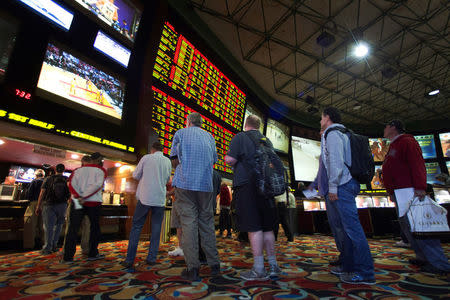Delaware sports betting first out of gate, but competitors close in
By Laila Kearney NEW YORK (Reuters) - Delaware gained a competitive edge on Tuesday in newly legal sports betting as the first U.S. state in a quarter century to expand its athletics gambling program, but the boost could be short lived as rival states close in, analysts said. At 1:30 p.m. EDT, the second smallest state went live, accepting bets on a gamut of professional sports, the first to roll out its betting program since last month's U.S. Supreme Court decision struck down a 1992 ban. Delaware also became the only East Coast state to offer legal athletics wagering. "Being first out of the gate may offer some first-mover advantages," said Randy Gerardes, director of municipal securities research for Wells Fargo Securities in New York. "But it's difficult to ascertain exactly how much activity that will stimulate or how much revenue," he said. Along with Nevada, Montana and Oregon, which has since suspended its sports betting operations, Delaware was given a partial reprieve from the Professional and Amateur Sports Protection Act of 1992. Under the exemption, Delaware was allowed only multi-game betting on professional football. As of Tuesday, it was set to also offer single-game and future betting on professional baseball, football, basketball, hockey, golf, soccer and auto racing. Wagering will at first be confined to the state's three casinos and then expand online. By already having limited sports betting, Delaware had the rules and infrastructure in place to swiftly expand gambling options when the SCOTUS decision landed, said Marcy Block, senior director at Fitch Ratings in New York. "They were already several steps ahead of a lot of other people," Block said. Still, Delaware and other U.S. states with sports gambling operations should not expect a windfall, Block said. "We believe that it's still going to be a very small part of the overall gaming market," she said. In a recent analysis, Moody's Investors Service said that even if every state broadly legalized athletics wagering, it would generate a combined $1.5 billion annually. That is less than 0.2 percent of states' combined operating funds. Despite Delaware's head start, analysts said any competitive edge could quickly soften as more states get betting systems up and running. "Initially they will be able to draw customers from nearby Pennsylvania and Maryland, but that's going to disappear really fast" as more states enact legal sports betting, said Frank Fantini, who heads Delaware-based gaming industry research firm Fantini Research. Nearby West Virginia and Pennsylvania, which have already legalized sports betting, are plowing ahead with their programs. New Jersey on Monday advanced its bill to legalize sports betting. Elsewhere, Mississippi, Rhode Island and Connecticut had legalized the practice in anticipation of the SCOTUS decision. More than a dozen other states have introduced legislation to legalize the practice since the ruling. As those states come on line, players will likely place bets close to home rather than drive across state lines to Delaware. "Casinos are very much a matter of conveniences, just like banks and 7-Elevens," Fantini said. (Reporting by Laila Kearney; Editing by Daniel Bases and David Gregorio)


